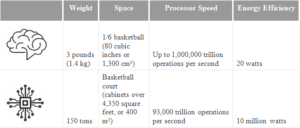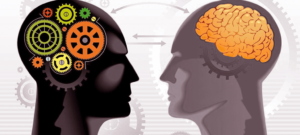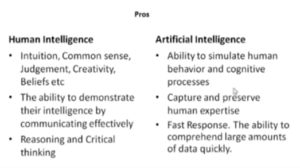Introduction:
In an economy where data is changing how companies create value and compete experts predict that using artificial intelligence {AI} at a larger scale will add as much $15.7 trillion to the global economy by 2030.
AI is an integrated field that draws on ideas and methods from many other disciplines, including computational science, cognitive science, language studies, neuroscience, psychology, and mathematics.
It is utilized in practically every business, including the media industry, graphics and animation, and more, to help technologies replicate human action based on their behavior.
One issue that today’s AI ha with demonstrating intelligence is exhibiting common sense knowledge to recognize that:
Human intelligence can provide several kinds of information. It can provide observations during travel or other events from travels, refugees who escaped friendly pows, etc. Finally, it can provide information on interpersonal relationships and network of interest.
Comparison of Brain with a Supercomputer:

Understanding both AI and human creative is important in order to compare and contrast the two a and determine which my come out on top, while human creativity is influenced by factors such as experience, emotions, and imagination.
AI has also facilitated the development of self-driving cars and drones, AI have made huge stride in automation and efficiency across industries with minimal human intervention needed.
Machine intelligence vs. human intelligence
In general, people recognize today’s advanced computers as intelligence because they have the potential to learn and make decisions based on the information they take in.
AI has the quality to informational patters that optimize trends relevant to the job. Human abilities, however, are more expansive.

The parent, of course, may recognize this understating gap and show an example of a taller structure with a broader AI may allow for more coordination and integration between of humans and technology. However, no matter how intelligent and autonomous AI become in certain respects, at least for the foreseeable future, they probably will remain unconscious machines or special purpose devices that support humans in specific, complex tasks.
Below is a table of when AI stared matching human performance across all eight skills:
| Skill | Matched Human Performance |
Database Used |
| Handwriting Recognition | 2018 | MNIST |
| Speech Recognition | 2017 | Switchboard |
| Image Recognition | 2015 | Image Net |
| Reading Comprehension | 2018 | SQUAD 1.1, 2.0 |
| Language Understanding |
2020 | GLUE |
| Common Sense Completion |
2023 | Hella Swag |
| Grade School Math | N/A | GSK8k |
| Code Generation | N/A | Human Eval |
In fact many of these databases like image net, switchboard, hella swag and hella swag didn’t exist before 2016.
In response to benchmarks being rendered obsolete, some of the newer databases are constantly being updates with new and relevant points.
Human intelligence and AI intelligence in table form:
|
Is AI intelligence Better than Human intelligence?
AI intelligence and human intelligence have complementary. Ai excels in automating specific tasks and handling repetitive, and creative to complex problem solving scenarios.
Human intelligence generally boasts a more powerful thinking, in terms of creativity and complex reasoning.
The hype about AI taking over the abilities of the human mind has raised the question of whether AI will replace humans in the future. AI has immense potential to automate tasks, give quick responses, critical thinking, the combination of human and AI intelligence can be the right approach to handle different tasks for the best result.
Human Touch vs. Artificial intelligence:
Human touch goes beyond physical contact; it includes emotional connections, empathy, and understanding. Human touch is fundamental in building trust, forming relationships, and conveying compassion.
You might have a read that the world is currently going through, unlike previous revolutions, this one is driven in AI intelligence machine learning.

This not only drives algorithms and directs what post from friend come up in your Google feed as an example, modern companies can make to more comprehensive, AI driven analytics.
We identify candidates through our network. As good as the data that’s in there.
AI systems operate with precision and consistency, minimizing errors and performing tasks with high efficiency. It can automate repetitive tasks, analyze patterns, and make predictions based on large datasets.
Which is more powerful human intelligence v/s artificial intelligence?
Comparing human intelligence and artificial intelligence (AI) is a complex and nuanced task. Each has its strengths and weaknesses, and they excel in different areas. Here are some factors to consider:

Processing Speed:
AI: Artificial intelligence systems can process information much faster than humans. They can perform complex calculations and analyze vast amounts of data in a fraction of the time it would take a human.
Learning Ability:
AI: Machine learning algorithms allow AI systems to learn from data and improve their performance over time.
Human: Humans have a remarkable ability to learn from various sources, adapt to new situations, and apply knowledge in diverse contexts.
Human Brain vs Artificial Intelligence Systems:
The human brain and artificial intelligence (AI) systems are both complex information processing systems, but they operate in fundamentally different ways. Here are some key points of comparison:
Processing Architecture:
The human brain and artificial intelligence (AI) systems are both complex information processing systems, but they operate in fundamentally different ways. Here are some key points of comparison:
Processing Architecture:
The human brain consists of around 86 billion neurons connected by trillions of synapses. It operates in a massively parallel and distributed manner, AI systems, including neural networks, are designed based on mathematical algorithms. They are typically organized in layers, with nodes in each layer connected by weights.
Learning:
Humans learn through a combination of innate capabilities and experiences. The brain is highly adaptive, AI systems, particularly machine learning models like neural networks, learn from data. Training involves adjusting the weights of connections based on input data and expected outputs.
Energy Efficiency:
The human brain is highly energy-efficient. It operates on about 20 watts of electrical power, Current AI systems, especially deep learning models, can be computationally intensive and energy-hungry.
Conclusion:
While artificial intelligence (AI) excels in processing vast amounts of data and executing repetitive tasks with precision, it lacks the nuanced understanding, creativity, and emotional intelligence inherent in human cognition. Humans bring unique qualities such as empathy, intuition, and complex problem-solving that AI struggles to replicate. The ideal scenario involves synergizing AI’s efficiency with human ingenuity, fostering a collaborative relationship where each complements the other’s strengths, leading to more comprehensive and effective outcomes.

